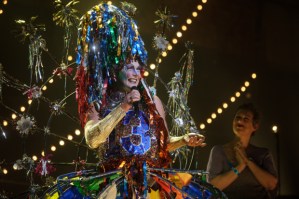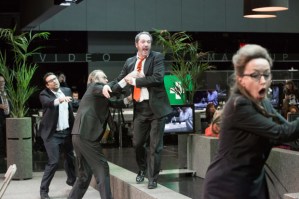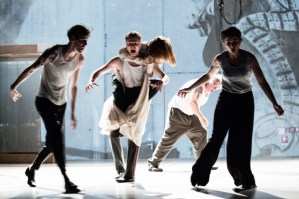As graphic novels are increasingly afforded literary respect, there is no reason why we shouldn’t see more of them onstage. In that, Belgian-Moroccan choreographer Sidi Larbi Cherkaoui, a double Olivier Award winner, leads the charge with this near-operatic staging of a manga classic. Yet the challenges of such adaptations are twofold – one stylistic, one structural. How to translate illustration into action? But also, how to reshape its stories for the stage? For all Pluto succeeds in turning two Ds into three, it falls absolutely flat when remade as drama.
At first, it seems like a fine choice of material. Derived from Osamu Tezuka’s influential post-war comic strip Atom (better known in the west as Astro Boy), Pluto reboots one episode, The Greatest Robot on Earth, into an epic, futuristic murder mystery. Not only did its author Naoki Urasawa, one of the most revered mangaka working today, turn it into a shadowy genre piece with real narrative thrust, he twisted the original’s post-nuclear politics into an incisive satire on American imperialism. It looks all the more prescient today. Rather than two opposing superpowers locked in a stand-off, Pluto shows how one dominant force can be held hostage by rogue states and embittered lone extremists.
Urasawa’s story starts, tantalisingly, with a string of robot murders: five of the seven most advanced machines on earth brutally destroyed. Having been key to ending a devastating pan-Asian war, each was cherished, even loved, by humanity – hence fears for the remaining two: Gesicht (Shunsuke Daitoh), an armour-plated robocop with super-human deductive powers, and Atom (Mirai Moriyama), built to be as human as possible – a replacement son for its grieving creator.
In their attempt to solve the crime – murder being a uniquely human act, but here requiring super-human power – Gesicht and Atom get pulled into growing global tensions between old enemies, the United States of Thracia and the Republic of Persia, as they battle for control of a vengeful super-robot, Pluto. It adds up to a puzzle of personal identity: at what point might machine be considered human. These automata seem to 'think', create, maybe even to 'feel'. They treat creators like fathers and pick up parenting skills, while mankind, spirals into a cycle of reflex revenge and seems to lose its claim to humanity. It’s a refreshingly optimistic vision of human-robot relations – well, mostly.
As it grows more cataclysmic, Pluto‘s narrative gets increasingly convoluted, but as an exercise in style, it’s a triumph. Taiki Ueda’s designs not only freely incorporate Urasawa's intricate and elegant illustrations, but realise them in three dimensions. His puppet robots range from cute bunraku style bots to towering Transformer-like metal monsters, but all come alive with impossible detail: their wiring, tubing and casing conveying real personality. Descending white panels split the action into frames, while white blocks are shuffled into abstract locations – cemeteries, laboratories and futurist flats – shifting the perspective constantly.
Cherkaoui, meanwhile, appreciates manga is as much about animation as it is aesthetic. His choreography communicates almost pictorially. A chorus of Atoms scratch away at a blackboard as if in stop-motion, and flying kicks and robot punches hang in the air as if paused at the moment of impact. Best of all, each robot is surrounded by a trio of dancers, flickering and fidgeting their hands in sign-ballet. It suggests inputs processed and actions computed and, sitting somewhere between human puppetry and danced emoji, it conveys both a lack of true free will and emotion or mood as data. It’s ingenious: actors as robots without dance-floor mechanics.
For all that, however, Pluto‘s story slowly stalls; too episodic to hold tension for more than three hours onstage. Urasawa’s epic gets bogged down in its own overblown mythology and its parabolic nature feels too slight for the stage. Too repetitive too: one big illustration of human/robot nature and the escalating cycles of vengeance and violence. Hope for the future then, but big challenges ahead.
Pluto runs at the Barbican Centre until 11 February.

















